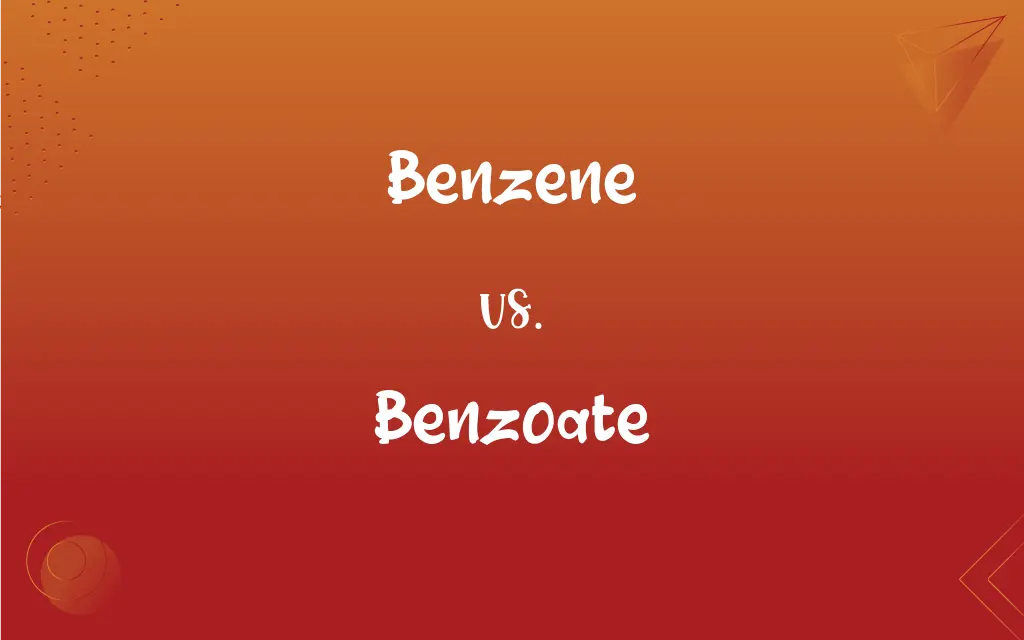Benzene vs. Benzoate: What's the Difference?
Edited by Janet White || By Harlon Moss || Published on January 24, 2024
Benzene is a simple aromatic hydrocarbon (C₆H₆) known for its ring structure, used in chemical synthesis. Benzoate refers to the salt or ester of benzoic acid, often used as a preservative in food and pharmaceuticals.

Key Differences
Benzene is a colorless, volatile liquid hydrocarbon, forming a ring structure, used in the manufacture of numerous chemicals. Benzoate is a compound derived from benzoic acid, primarily used as a food preservative.
The chemical structure of benzene includes six carbon atoms arranged in a hexagonal ring, bonded with hydrogen atoms. In benzoate, the hydrogen atom of the carboxyl group in benzoic acid is replaced by another atom or group.
Benzene is known for its role in the petrochemical industry, used in making plastics, resins, and synthetic fibers. Benzoates are often used in food products, like sodium benzoate, to inhibit microbial growth.
Exposure to benzene can be hazardous as it is a known carcinogen. In contrast, benzoates, when used within regulatory limits, are generally recognized as safe in food and cosmetics.
In environmental context, benzene can be a pollutant, stemming from industrial processes. Meanwhile, benzoates are scrutinized for their potential environmental impact, particularly in water systems.
ADVERTISEMENT
Comparison Chart
Chemical Structure
Ring of six carbon atoms with hydrogen
Benzoic acid derivative, with a replaced hydrogen in carboxyl group
Use in Industry
Making plastics, resins, synthetic fibers
Food preservative, pharmaceuticals
Health Impact
Carcinogenic, toxic with exposure
Safe within limits, used in food and cosmetics
Environmental Impact
Pollutant in industrial emissions
Concerns in water systems
Physical State
Colorless, volatile liquid
Solid in its salt form, like sodium benzoate
ADVERTISEMENT
Benzene and Benzoate Definitions
Benzene
Colorless and highly flammable liquid.
The laboratory stored benzene in airtight containers.
Benzoate
Salt or ester of benzoic acid.
Sodium benzoate is used as a preservative in acidic foods.
Benzene
Known as a building block in petrochemicals.
Benzene derivatives are vital for synthetic rubber production.
Benzoate
Has antimicrobial properties.
Benzoate is effective in inhibiting yeast and mold.
Benzene
Hazardous substance and known carcinogen.
Industrial facilities monitor benzene levels for safety.
Benzoate
Commonly used as a food preservative.
Benzoate extends the shelf life of carbonated drinks.
Benzene
Aromatic hydrocarbon with a ring structure.
Benzene is a key component in the production of polystyrene.
Benzoate
Used in pharmaceutical formulations.
Benzoate compounds are found in some medicinal syrups.
Benzene
Organic chemical compound, C₆H₆.
Benzene is used as a starting material in the synthesis of drugs.
Benzoate
Generally recognized as safe within regulatory limits.
The FDA regulates the amount of benzoate in food products.
Benzene
A colorless, flammable, toxic, liquid aromatic hydrocarbon, C6H6, derived from petroleum and used in or to manufacture a wide variety of chemical products, including DDT, detergents, insecticides, and motor fuels. Also called benzol.
Benzoate
A salt, ester, or anion of benzoic acid.
Benzene
(organic compound) An aromatic hydrocarbon of formula C6H6 whose structure consists of a ring of alternate single and double bonds.
Benzoate
(organic chemistry) Any salt or ester of benzoic acid.
Benzene
Sometimes used in place of the phenyl group.
Benzoate
A salt formed by the union of benzoic acid with any salifiable base.
Benzene
A volatile, very inflammable liquid, C6H6, contained in the naphtha produced by the destructive distillation of coal, from which it is separated by fractional distillation. The name is sometimes applied also to the impure commercial product or benzole, and also, but rarely, to a similar mixed product of petroleum.
Benzoate
Any salt or ester of benzoic acid
Benzene
A colorless liquid hydrocarbon; highly inflammable; carcinogenic; the simplest of the aromatic compounds
FAQs
Can benzene be found in nature?
It's present in crude oil and some natural gases.
Is benzene harmful?
Yes, it's carcinogenic and toxic.
Are benzene vapors dangerous?
Yes, they are toxic and flammable.
Is benzene soluble in water?
It has limited solubility in water.
Are benzoates safe in food?
Yes, within regulatory limits.
Is sodium benzoate a type of benzoate?
Yes, it's a common benzoate salt.
What foods contain benzoates?
Commonly in acidic foods and soft drinks.
Is benzene found in gasoline?
Yes, as a constituent component.
What is benzene used for?
For producing plastics, resins, and synthetic fibers.
Can benzoates cause allergies?
In rare cases, they may trigger allergic reactions.
Are benzoates environmentally friendly?
Their impact on water systems is a concern.
How do benzoates preserve food?
By inhibiting yeast and mold growth.
Are there alternatives to benzene in industry?
Some safer chemicals are being explored.
What are benzoates used for?
Mainly as food preservatives and in pharmaceuticals.
Do benzoates have any health benefits?
They help prevent microbial growth in products.
Is benzene used in pharmaceuticals?
It's a precursor in some drug syntheses.
How is benzene produced industrially?
Through the refining of petroleum.
Can benzene cause long-term health issues?
Yes, like leukemia and bone marrow failure.
Can benzene be detected in the air?
Yes, with specific monitoring equipment.
Is benzoate natural or synthetic?
It can be either, depending on its source.
About Author
Written by
Harlon MossHarlon is a seasoned quality moderator and accomplished content writer for Difference Wiki. An alumnus of the prestigious University of California, he earned his degree in Computer Science. Leveraging his academic background, Harlon brings a meticulous and informed perspective to his work, ensuring content accuracy and excellence.
Edited by
Janet WhiteJanet White has been an esteemed writer and blogger for Difference Wiki. Holding a Master's degree in Science and Medical Journalism from the prestigious Boston University, she has consistently demonstrated her expertise and passion for her field. When she's not immersed in her work, Janet relishes her time exercising, delving into a good book, and cherishing moments with friends and family.






































































